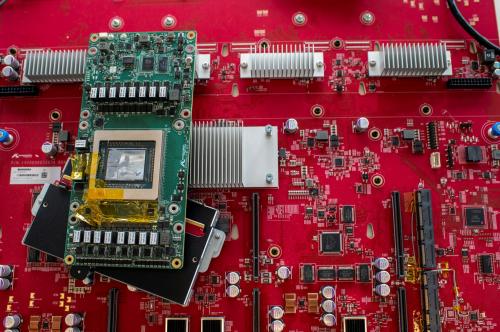Brookings President Strobe Talbott and Distinguished Fellow Javier Solana visited Kyiv March 31-April 1, where they met with President Victor Yanukovych, opposition leader Yulia Tymoshenko, and other Ukrainian officials and policy experts from across the political spectrum. Brookings Senior Fellow Steven Pifer, who accompanied Talbott and Solana, subsequently wrote up his impressions of current Ukrainian foreign policy in an article for the Ukrainian newspaper, Den. Pifer describes the nuances of Yanukovych’s emerging policy, including the priority that Kyiv continues to attach to integration into Europe. Den ran the article in its English edition of April 13; the article originally appeared in the Ukrainian version of Den on April 8.
Since Victor Yanukovych became Ukraine’s fourth president in February, a number of questions have arisen in Washington and Europe about Kyiv’s foreign policy. Some changes certainly are to be expected. After all, as a candidate, Mr. Yanukovych expressed different foreign policy views than those of his predecessor, Victor Yushchenko, and democratic elections have consequences.
Kyiv appears to be still in the process of formulating its foreign policy line. The West has heard suggestions from Ukraine about adopting a non-aligned or non-bloc status, continuing engagement with the European Union, or turning back toward Russia, perhaps in the form of reorienting Ukraine’s trade relations to join the customs union with Russia, Belarus and Kazakhstan. One senior Ukrainian official even publicly raised the prospect that Ukraine might enter into a full union with Russia and Belarus. So, some confusion in the West about Ukraine’s foreign policy direction is understandable.
I accompanied former US Deputy Secretary of State Strobe Talbott and former EU High Representative for Common Foreign and Security Policy Javier Solana during their March 31-April 1 visit to Kyiv. The visit, generously sponsored and organized by the Victor Pinchuk Foundation, included meetings with President Yanukovych, former Prime Minister Yulia Tymoshenko and a group of other Ukrainian officials and policy experts from across the political spectrum. Those discussions left me with several impressions regarding current Ukrainian foreign policy.
First, the terms “non-aligned” and “non-bloc” do not have identical meaning. Both terms have been used to describe the new president’s policy, but they mean different things. “Non-aligned” suggests a choice to position Ukraine between the West and Russia and carefully avoid getting too close to either. One senior Ukrainian official adamantly rejected that term as an inaccurate description of Kyiv’s foreign policy. He termed “non-bloc” the better term, adding that a non-bloc policy would preclude integration into NATO but not rule out drawing closer to the European Union.
Second, Kyiv is interested in a new European security system but at this point lacks a concept. Russian President Dmitry Medvedev called almost two years ago for the creation of a new European or Euro-Atlantic security architecture. Several Ukrainian officials and foreign policy experts raised the idea with us last week. We did not, however, hear much in the way of specifics other than that Kyiv would like reaffirmation of the security assurances it received when it acceded to the Non-Proliferation Treaty as non-nuclear weapons state in December 1994.
I would offer two observations on this. A process is taking form that could lead to discussion of – and, perhaps ultimately, even agreement on – a new Euro-Atlantic security architecture. But that concept will take considerable time to develop. In the end, it could complement institutions such as the European Union and NATO, but it will not supplant them. As for Ukraine’s desire for reaffirmation of the 1994 assurances, Presidents Obama and Medvedev reaffirmed them in their December 2009 joint statement on the occasion of the expiration of the Strategic Arms Reductions Treaty. Kyiv should take care not to pursue its desire in a way that inadvertently undermines the credibility of the assurances it has already received.
Third, Ukraine wants to make up lost ground in its relationship with Russia, though both sides will likely find they cannot achieve all that they seek. Ukrainian officials described the priority that Kyiv currently attaches to working with Moscow as reflecting a desire to “normalize” relations with a strategic partner that had deteriorated in previous years. Kyiv hopes to use a “reset” in its relationship with Moscow to secure, among other things, a change in the contract under which it purchases natural gas from Russia. It is not clear, however, what incentives Ukraine can offer Gazprom to lower the price.
Likewise, Moscow hopes it can entice Kyiv to join the customs union with Russia, Belarus and Kazakhstan, but most Ukrainians with whom we talked ruled out that possibility. They said Ukraine’s WTO commitments precluded joining the customs union and that Kyiv’s priority was a free trade arrangement with the European Union.
Fourth, Kyiv will not pursue a membership action plan with NATO but still wants good relations. The issues of NATO membership or a membership action plan have fallen off the agenda in Ukraine. Senior Ukrainian officials made clear, however, that Ukraine sought practical cooperation with the Alliance. Indeed, when Mr. Yanukovych headed the cabinet in 2006-2007, practical cooperation between NATO and Ukraine was as strong as at any point in the past five years.
Fifth, continued integration into the European Union is high on Kyiv’s list of priorities. Virtually everyone with whom we spoke emphasized that EU integration remains important. They saw the association agreement, a deep and comprehensive free trade arrangement, and a visa facilitation understanding as the vehicles to achieve this. This does not come as a surprise: the political stability and economic standard of living of the European Union have long been a magnet for countries on the EU’s frontiers.
Sixth, Ukraine desires robust relations with the United States. We heard that President Yanukovych wants to build on the US-Ukraine strategic charter that was concluded at the end of 2008 and broaden the bilateral relationship between Kyiv and Washington.
Seventh, a significant portion of the Ukrainian political spectrum fears a change in Ukraine’s strategic course. Some statements from the new government have raised concern that President Yanukovych and his team intend a major change in direction, including in ways that would compromise the country’s sovereignty.
It is up to President Yanukovych to determine his foreign policy. If it is non-bloc instead of non-aligned; if it favors continued integration with the European Union, practical cooperation with NATO and strong relations with the United States; and if it aims to restore better relations with Russia while not compromising Ukrainian sovereignty, the West will welcome that policy. Both the European Union and United States could easily engage Kyiv on those terms. NATO could also work with such a policy; most Western experts understand that neither Ukraine’s public nor its elite at this point support joining the Alliance. NATO’s open door will remain open, but it will be up to Kyiv to decide how far and how fast to go.
This seems a sensible approach for Ukraine’s foreign policy – if it is President Yanukovych’s approach. It would be useful for him to articulate his vision for Ukraine’s engagement with the world. Such a statement would have multiple audiences – in Ukraine and abroad – and could put to rest some of the worries and concerns that have arisen over the past month.



Commentary
Op-edUnderstanding Ukraine’s Foreign Policy
April 13, 2010